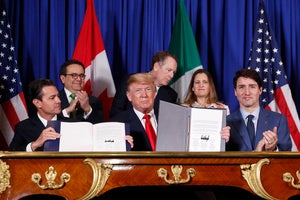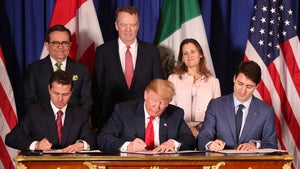Majorities across party lines believe trade with Canada and Mexico strengthens US national security.
Trade tensions between the United States and Canada have been growing since US President Donald Trump started his second term in office. On October 23, Trump announced he was ending trade negotiations with Canada because of a television ad quoting the late US President Ronald Reagan criticizing US tariffs. This came just after Canadian Prime Minister Mark Carney stated his desire to double Canadian exports to non-US countries over the next decade in response to Trump’s tariffs. These moves put the formal joint review and renewal of the US-Mexico-Canada trade agreement (USMCA) set for July 2026 at risk.
The American public was initially ambivalent about the North American Free Trade Agreement (NAFTA) in the early 2000s. But data from a Chicago Council on Global Affairs-Ipsos survey conducted October 17–19, 2025, finds that today, solid majorities across the political spectrum support its successor, the USMCA. Americans think the United States is economically better off when the three nations work together and that trade with both Canada and Mexico strengthens US national security.
Key Findings
- Three in four Americans (75%) say the US-Mexico-Canada (USMCA) free trade agreement is good for the US economy.
- Majorities of Americans see trade with Canada (81%) and Mexico (71%) as benefiting US national security.
- Americans continue to rate Canada most favorably, giving it an average score of 73 on a zero to 100 scale (where zero represents a very negative view and 100 represents a very positive view).
- On each of these items, Republicans are less positive than Democrats and Independents, though majorities still favor working trilaterally on trade.
Majorities Across Party Lines Say USMCA Good for US Economy
President Donald Trump, Canadian Prime Minister Justin Trudeau, and Mexican President Enrique Peña Nieto signed the United States-Mexico-Canada Agreement (USMCA) in 2020, after Trump renegotiated the 1994 North American Free Trade Agreement (NAFTA). Canada and Mexico are the top US trading partners, and US exports to these countries have grown by 46 percent since the USMCA took effect. Previously expected to be more of a formality than serious revamp, the Trump administration’s tariffs on Canada and Mexico have added uncertainty into the North American economic relationship.
A majority of Americans (75%) consider the USMCA trade agreement good for the US economy, with similar majorities of Democrats (79%), Independents (75%), and Republicans (74%) viewing the deal positively. Since 2017, NAFTA renegotiations began, support for NAFTA and then USMCA has risen notably. Over the same period of time, the differences between Republicans and Democrats have narrowed considerably from a difference of 38 percentage points to just five points today.
While Democrats remain most supportive, Republicans have embraced North American trade following the signing of the USMCA in the first Trump administration. While just 44 percent of Republicans saw NAFTA as good for the US economy in 2018, 86 percent saw the rebranded USMCA as good in 2019.
US-Mexico-Canada Trade and US National Security
In line with public support for the USMCA trade agreement, most Americans say trade with Canada (81%) and Mexico (71%) strengthens, rather than weakens, US national security. This includes majorities across party lines, though a much smaller majority of Republicans than Democrats (82%) and Independents (73%) believe US-Mexico trade strengthens US national security.
Given their positive views of US-Mexico-Canada trade, Americans oppose placing US tariffs on both countries. An April 2025 Reuters-Ipsos survey found 61 percent of Americans opposed new tariffs on imported goods from Canada (36% support) and 56 percent opposed new tariffs on goods from Mexico (40% support). In each case, however, majorities of Republicans favored new tariffs, while majorities of Democrats and Independents opposed them.
American Views of Canada and Mexico Positive Despite Partisan Divisions
One of the reasons the US public backs these North American trade links is their warm feelings for both neighbors. Americans continue to view Canada warmly, giving their northern neighbor an average of 73 on a 0–100 scale, where 0 represents a very unfavorable feeling and 100 represents a very favorable feeling. As in past Council surveys, this is the highest of all countries asked about (see appendix). Mexico is rated less positively, with an average of 58 out of 100. This score represents a notable increase over the low points recorded in the early 2010s, when averages dipped below 50.
There are some partisan differences. Republicans are less favorably inclined toward both countries. They give Canada an average rating of 65, compared to Democrats’ 82 and Independents’ 73. This partisan gap in American attitudes toward Canada is a recent phenomenon: In 2020, Republicans rated Canada an average of 79, similar to the views of Democrats (85) and Independents (79).
Republicans also view Mexico less favorably than other Americans—but whereas their views of Canada have declined recently, Republican views of Mexico have improved, both over the short term (up from 43 in April 2025) and over the past decade (after hitting a low of 36 in 2013). Democratic views of Mexico have also risen notably over the past decade, from 47 in 2013 to 67 today. Independents have also grown more favorably inclined toward Mexico over the same period (61, up from a low of 43 in 2013).
Conclusion
Canada and Mexico are the top US trading partners, and US exports to these countries have grown by 46 percent since the USMCA took effect. While experts believe the agreement could be improved, they also say failure to continue the trilateral cooperation could reverse these advances and make it more difficult for any of the three nations to decouple from Chinese supply chains in areas of concern. For its part, the American public is highly positive about the agreement, views its northern and southern neighbors favorably, and sees North American trade as strengthening US national security. Whether the three nations and their leaders are able to reach agreement on extending the USMCA and further developing North America as an economic power remains to be seen.
This analysis is based on data from two surveys. The first is the 2025 Chicago Council Survey of the American public on foreign policy, a project of the Lester Crown Center on US Foreign Policy.
The 2025 Chicago Council Survey was conducted July 18–30, 2025, by Ipsos using its large-scale, nationwide, online research panel (KnowledgePanel) in English and Spanish among a weighted national sample of 2,148 adults 18 or older living in all 50 US states and the District of Columbia. The margin of sampling error for the full sample is ±2.2 percentage points, including a design effect of 1.07.
Partisan identification is based on how respondents answered a standard partisan self-identification question: “Generally speaking, do you think of yourself as a Republican, a Democrat, an Independent, or what?”
The 2025 Chicago Council Survey is made possible by the generous support of the Crown family and the Korea Foundation.
Additional results reported from October 2025 are from a Chicago Council on Global Affairs-Ipsos survey conducted October 17–19, 2025, by Ipsos using its large-scale, nationwide, online research panel (KnowledgePanel) among a weighted national sample of 1,016 adults 18 or older living in all 50 US states and the District of Columbia. The margin of sampling error for the full sample is ±3.2 percentage points, including a design effect of 1.06. The data for the total sample were weighted to adjust for gender by age, race/ethnicity, education, Census region, metropolitan status, and household income using demographic benchmarks from the 2025 March Supplement of the Current Population Survey (CPS). The specific categories used were:
- Gender (Male, Female) by Age (18–29, 30–44, 45–59 and 60+)
- Race/Hispanic Ethnicity (White Non-Hispanic, Black Non-Hispanic, Other Non-Hispanic, Hispanic, 2+ Races Non-Hispanic)
- Education (Less than High School, High School, Some College, Bachelor or Higher)
- Census Region (Northeast, Midwest, South, West)
- Metropolitan Status (Metro, Non-Metro)
- Household Income (Under $25,000, $25,000–$49,999, $50,000–$74,999, $75,000–$99,999, $100,000–$149,999, $150,000+)





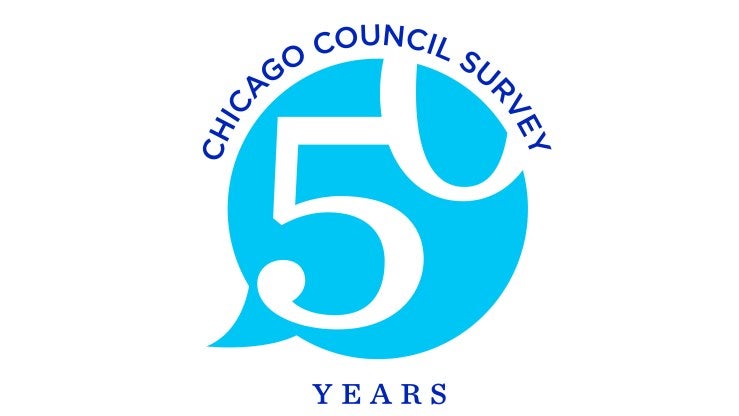
Related Content
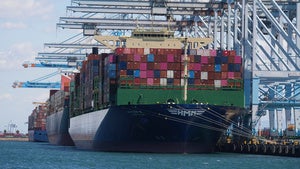 Public Opinion
Public Opinion
Large majorities of the public view international trade as good for the US economy, job creation, and people like them.
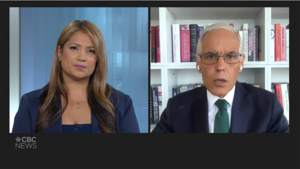 Global Economy
Global Economy
Julián Ventura joins CBC News to discuss the "multi-dimensional chess game" taking place between the United States, Mexico, and Canada.
